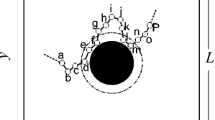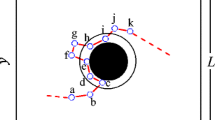Abstract
We performed Monte Carlo simulations to study the destabilization processes of large neutral and flexible polymer chains due to irreversibly adsorbed colloidal particles attached to the chains like beads on a necklace. The particles are modeled as charged spherical units which interact with each other via repulsive electrostatic and attractive van der Waals (vdW) potentials. The usual Monte Carlo search procedure is extended and carefully checked to completely sample the chain conformational space and achieve dense conformations in the limit of both strong attractive and repulsive interaction potentials. Configurational properties, such as the radius of gyration, the end-to-end length, and the Kuhn length, are calculated as a function of the intensity of the vdW interactions and ionic strength values. It is observed that chains exhibit a new range of possible conformations compared to the classical random walk and self avoiding walk chains or polyelectrolytes. In the limit of low salt concentration, by gradually increasing vdW interactions, chains undergo a cascade of transitions from extended structures to dumbbells, from dumbbells to pearl necklaces, and from pearl necklaces to collapsed coils. Because of strong competition between the vdW and electrostatic forces, the distance along the chain between the interacting particles, and the sampling limitations, these transitions are found to sample metastable domains and to depend on the initial conformations. To gain insight into the spatial organization of the collapsed conformations, the pair correlation functions of both monomers and particles are calculated. It is shown that collapsed conformations which are the result of strong particle–particle interactions exhibit two distinct parts: a hard core mainly composed of particles and a surrounding polymeric shell composed of loops and tails. Possible effects of such a collapsed transition on the kinetics of flocculation of a mixture containing large flexible chains and small adsorbing colloidal particles are discussed.
Similar content being viewed by others
Author information
Authors and Affiliations
Additional information
Received: 26 July 1999 Accepted in revised form: 9 November 1999
Rights and permissions
About this article
Cite this article
Chodanowski, P., Stoll, S. Collapse transitions of a supersized neutral chain due to irreversibly adsorbed small colloidal particles. Colloid Polym Sci 278, 406–417 (2000). https://doi.org/10.1007/s003960050533
Issue Date:
DOI: https://doi.org/10.1007/s003960050533




